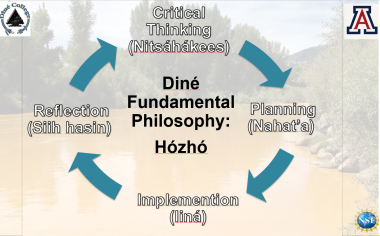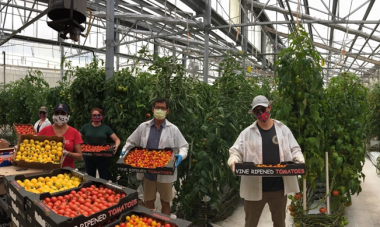Indigenous Food, Energy, and Water Security and Sovereignty (Indige-FEWSS)
Dine Philosophy Graph.png

Worldwide, approximately 370 million indigenous people live in over 90 countries. Although, indigenous people are only approximately 5% of the world population, they represent 90% of the cultural diversity and hold 20% of the land that maintains 80% of the world's remaining biodiversity. However, indigenous people often lack access to energy, water, and food infrastructure. For example:
- 14% of U.S. Native American households lack access to electricity.
- On the Navajo Nation, our partners for this graduate student training experience, approximately 35% of dwellings are not connected to central power or potable water.
To develop this workforce, our project, Indigenous Food, Energy, and Water Security and Sovereignty or Indige-FEWSS will educate and engage students, with an emphasis on recruitment of first-generation and minority students seeking opportunities, to make a difference in developing communities.
The overall research theme is the development of novel and sustainable solutions for off-grid production of safe drinking water, brine management operations, and controlled environment agriculture systems. This includes research in innovative photovoltaics; holographics; sensors and controls; unit operation technologies; and material, device, and systems resiliency.
Indege-Fewss Photo.png

Indige-FEWSS will build upon the following research activities:
- Novel photovoltaic materials and technologies for Controlled Environment Agriculture;
- Management of coupled natural-human systems for production of fit-for-use water from brackish groundwater.
The expected outcomes are:
- Transformative advances in sustainable water and agricultural systems are achieved through graduate student driven transdisciplinary research; and
- Indigenous communities are directly involved in the development and piloting of the systems and are trained effectively to be able to inherit and maintain the systems.
The overarching goal is to provide a unique, on-site research, and training opportunity for masters and PhD students that bridges engineering, social, and physical sciences. We combine classwork, internships, teaching, and community interactions to enable trainees to tackle critical real world FEWS problems, with an understanding of the cultures and sovereignty of indigenous peoples. To learn more about this program, please go to: https://energy.arizona.edu/indigefewss

